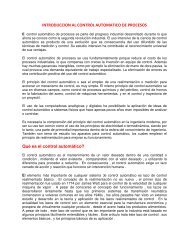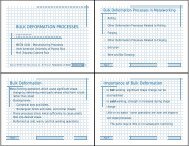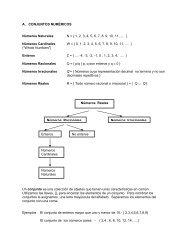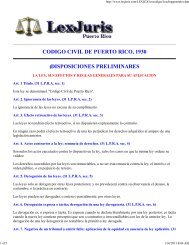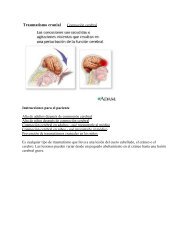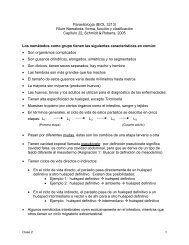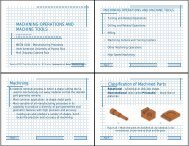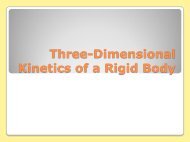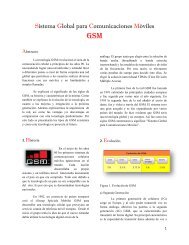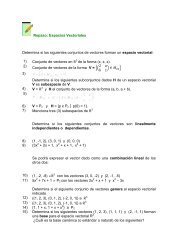FEEDBACK CONTROL, DESIGN PROCESS
FEEDBACK CONTROL, DESIGN PROCESS
FEEDBACK CONTROL, DESIGN PROCESS
You also want an ePaper? Increase the reach of your titles
YUMPU automatically turns print PDFs into web optimized ePapers that Google loves.
<strong>FEEDBACK</strong> <strong>CONTROL</strong>, <strong>DESIGN</strong><br />
<strong>PROCESS</strong><br />
AMILCAR RINCON CHARRIS<br />
MECN 4610
Unity feedback system
SECOND ORDER CLOSED LOOP
PID <strong>CONTROL</strong>LER<br />
Kp = Proportional gain<br />
KI = Integral gain<br />
Kd = Derivative gain
<strong>CONTROL</strong> SIGNAL<br />
The variable (e) represents the tracking error, the difference between the<br />
desired input value (R) and the actual output (Y). This error signal (e) will<br />
be sent to the PID controller, and the controller computes both the<br />
derivative and the integral of this error signal. The signal (u) just past the<br />
controller is now equal to the proportional gain (Kp) times the magnitude<br />
of the error plus the integral gain (Ki) times the integral of the error plus<br />
the derivative gain (Kd) times the derivative of the error.
Example Problem<br />
M = 1kg<br />
b = 10 N.s/m<br />
k = 20 N/m<br />
F(s) = 1<br />
The goal of this problem is to show you how each of Kp, Ki and Kd contributes to obtain<br />
•Fast rise time<br />
•Minimum overshoot<br />
•No steady‐state state error
Open‐loop step response
Open‐loop step response MUX
Proportional Controller
Kp=10
Kp=50, 100, 200, 1000
Effects of controllers Kp<br />
•A proportional controller (Kp) will have the effect of<br />
reducing the rise time and will reduce ,but never<br />
eliminate, the steady‐state error.<br />
CL RESPONSE RISE TIME OVERSHOOT<br />
SETTLING<br />
TIME<br />
S‐S ERROR<br />
Kp Decrease Increase Small Change Decrease
PI Controller
Effects of controllers Ki<br />
•An integral control (Ki) will have the effect of eliminating<br />
the steady‐statestate error, but it may make the transient<br />
response worse.<br />
CL RESPONSE RISE TIME OVERSHOOT<br />
SETTLING<br />
TIME<br />
S‐S ERROR<br />
Ki Decrease Increase Increase Eliminate
PD Controller
Effects of controllers Kd<br />
•A derivative control (Kd) will have the effect of<br />
increasing the stability of the system, reducing the<br />
overshoot, and improving the transient response.<br />
CL RESPONSE RISE TIME OVERSHOOT<br />
SETTLING<br />
TIME<br />
S‐S ERROR<br />
Kd Small Change Decrease Decrease Small Change
PID <strong>CONTROL</strong>LER
Effects of each of controllers Kp, Kd, Ki<br />
•A proportional controller (Kp) will have the effect of reducing the rise time and will<br />
reduce ,but never eliminate, the steady‐state error.<br />
•An integral control (Ki) will have the effect of eliminating i i the steady‐state error, but it<br />
may make the transient response worse.<br />
•A derivative control (Kd) will have the effect of increasing the stability of the system,<br />
reducing the overshoot, and improving the transient response.<br />
CL RESPONSE RISE TIME OVERSHOOT<br />
SETTLING<br />
TIME<br />
S‐S ERROR<br />
Kp Decrease Increase Small Change Decrease<br />
Ki Decrease Increase Increase Eliminate<br />
Kd Small Change Decrease Decrease Small Change
General tips for designing a PID<br />
controller<br />
When you are designing a PID controller for a given system,<br />
follow the steps shown below to obtain a desired response.<br />
• Obtain an open‐loop response and determine what needs<br />
to be improved<br />
• Add a proportional control to improve the rise time<br />
• Add a derivative control to improve the overshoot<br />
• Add an integral control to eliminate the steady‐state error<br />
• Adjust each of Kp, Ki, and Kd until you obtain a desired<br />
overall response. You can always refer to the tbl table shown in<br />
this "PID Tutorial" page to find out which controller controls<br />
what characteristics.




